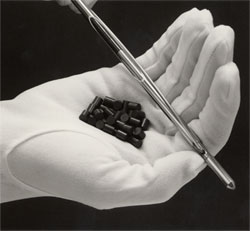Nuclear fuel
Nuclear fuel is a material used in nuclear power stations to produce heat through nuclear fission. This heat is then used to generate electricity through steam turbines. The most common nuclear fuels are isotopes of uranium and plutonium, with Uranium-235 and Plutonium-239 being the primary fissile materials used in nuclear reactors.
Types of Nuclear Fuel[edit | edit source]
- Uranium: The most widely used nuclear fuel, found naturally. Enrichment processes increase the concentration of U-235 to make it suitable for nuclear fission.
- Plutonium: Created as a by-product in reactors from uranium-238, it can be recycled as a fuel for fast-breeder reactors or mixed oxide (MOX) fuel.
- Mixed Oxide (MOX) Fuel: A blend of plutonium and natural or depleted uranium which recycles plutonium from spent nuclear fuel.
- Thorium: Considered as an alternative to uranium due to its abundance and potential for use in thorium-based reactors, which produce less long-lived radioactive waste.
Nuclear Fuel Cycle[edit | edit source]
The nuclear fuel cycle describes the processes involved in the production, use, and disposal of nuclear fuel. This includes:
- Uranium Mining: The extraction of uranium from the earth.
- Fuel Fabrication: The process of manufacturing nuclear fuel to be used in reactors.
- Uranium Enrichment: Increasing the concentration of U-235 in uranium for use in light water reactors.
- Spent Fuel Reprocessing: The chemical process used to recover fissionable material from spent nuclear fuel.
- Waste Management: The safe storage and disposal of radioactive waste produced from nuclear power generation.
Advantages of Nuclear Fuel[edit | edit source]
- High Energy Density: Nuclear fuel contains millions of times the energy equivalent of oil or gas.
- Low Greenhouse Gas Emissions: Nuclear power plants emit negligible amounts of carbon dioxide during operation.
- Reliability: Nuclear power plants can operate continuously for long periods before needing to refuel, providing a stable source of electricity.
Challenges and Concerns[edit | edit source]
- Nuclear Waste: The management and disposal of highly radioactive waste remain a significant challenge.
- Nuclear Proliferation: The potential for the diversion of nuclear material for weapons poses a security risk.
- Safety Concerns: Accidents such as those at Chernobyl and Fukushima have raised concerns about nuclear power plant safety.
Glossary[edit | edit source]
- Fissile Material: A substance capable of sustaining a nuclear fission chain reaction.
- Nuclear Fission: The process of splitting a heavy atomic nucleus into two smaller nuclei with the release of energy.
- Radioactive Waste: Waste type containing radioactive chemical elements that does not have a practical purpose.
- Uranium-235: An isotope of uranium making up about 0.7% of natural uranium. It is the only naturally occurring isotope that is fissile.
- Fast-Breeder Reactor: A type of nuclear reactor that creates more fissile material than it consumes.
Also see[edit | edit source]
| Nuclear power by country | ||||||||||
|---|---|---|---|---|---|---|---|---|---|---|
|
| Natural resources | ||||||||
|---|---|---|---|---|---|---|---|---|
* Category
|
| This article is a stub. You can help WikiMD by registering to expand it. |
Search WikiMD
Ad.Tired of being Overweight? Try W8MD's physician weight loss program.
Semaglutide (Ozempic / Wegovy and Tirzepatide (Mounjaro / Zepbound) available.
Advertise on WikiMD
|
WikiMD's Wellness Encyclopedia |
| Let Food Be Thy Medicine Medicine Thy Food - Hippocrates |
Translate this page: - East Asian
中文,
日本,
한국어,
South Asian
हिन्दी,
தமிழ்,
తెలుగు,
Urdu,
ಕನ್ನಡ,
Southeast Asian
Indonesian,
Vietnamese,
Thai,
မြန်မာဘာသာ,
বাংলা
European
español,
Deutsch,
français,
Greek,
português do Brasil,
polski,
română,
русский,
Nederlands,
norsk,
svenska,
suomi,
Italian
Middle Eastern & African
عربى,
Turkish,
Persian,
Hebrew,
Afrikaans,
isiZulu,
Kiswahili,
Other
Bulgarian,
Hungarian,
Czech,
Swedish,
മലയാളം,
मराठी,
ਪੰਜਾਬੀ,
ગુજરાતી,
Portuguese,
Ukrainian
Medical Disclaimer: WikiMD is not a substitute for professional medical advice. The information on WikiMD is provided as an information resource only, may be incorrect, outdated or misleading, and is not to be used or relied on for any diagnostic or treatment purposes. Please consult your health care provider before making any healthcare decisions or for guidance about a specific medical condition. WikiMD expressly disclaims responsibility, and shall have no liability, for any damages, loss, injury, or liability whatsoever suffered as a result of your reliance on the information contained in this site. By visiting this site you agree to the foregoing terms and conditions, which may from time to time be changed or supplemented by WikiMD. If you do not agree to the foregoing terms and conditions, you should not enter or use this site. See full disclaimer.
Credits:Most images are courtesy of Wikimedia commons, and templates, categories Wikipedia, licensed under CC BY SA or similar.
Contributors: Prab R. Tumpati, MD




